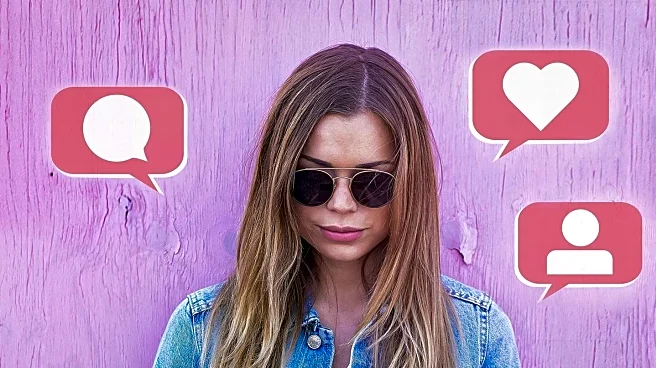What is the story about?
What's Happening?
The year 2025 has seen a surge in new slang terms, primarily driven by Generation Z's engagement with social media platforms like TikTok, Instagram, and gaming communities. According to an analysis by Unscramblerer.com, which utilized Google Trends data, terms such as '6-7', 'Ohio', and 'mogging' have become popular among younger demographics. These terms often carry meanings that are not immediately apparent to older generations. For instance, '6-7' is a humorous reference originating from a Skrilla song and a viral video featuring basketball player LaMelo Ball. 'Ohio' is used to describe something strange or cringey, while 'mogging' is a compliment indicating superiority in attractiveness or skill. This evolving lexicon highlights the dynamic nature of language as it adapts to new cultural and technological influences.
Why It's Important?
The rapid evolution of slang reflects broader cultural shifts and the influence of digital media on communication. As younger generations create and popularize new terms, they shape the way language is used and understood. This phenomenon underscores the importance of understanding these linguistic changes, especially for marketers, educators, and communicators who aim to engage effectively with younger audiences. The ability to decode and utilize contemporary slang can enhance communication strategies and foster better connections across generational divides. Moreover, it highlights the adaptability of language in response to technological advancements and cultural trends.
What's Next?
As social media continues to evolve, it is likely that new slang terms will emerge, further influencing the way language is used. Stakeholders such as educators and linguists may focus on studying these changes to better understand their implications on communication and cultural identity. Additionally, businesses and marketers might seek to incorporate these terms into their strategies to resonate with younger consumers. The ongoing dialogue between generations about language use may also lead to greater awareness and appreciation of linguistic diversity.
Beyond the Headlines
The emergence of new slang terms also raises questions about the preservation of traditional language forms and the potential for miscommunication across generations. As language becomes more fragmented, there may be challenges in maintaining clear and effective communication in professional and academic settings. Furthermore, the role of social media as a catalyst for linguistic change highlights the need for critical media literacy, enabling individuals to navigate and interpret the vast array of information and cultural expressions encountered online.

















